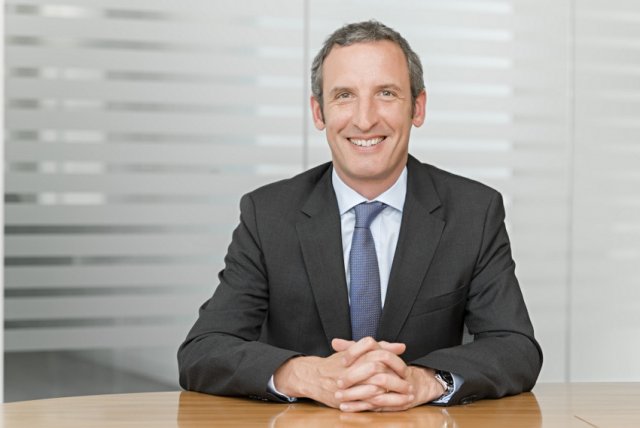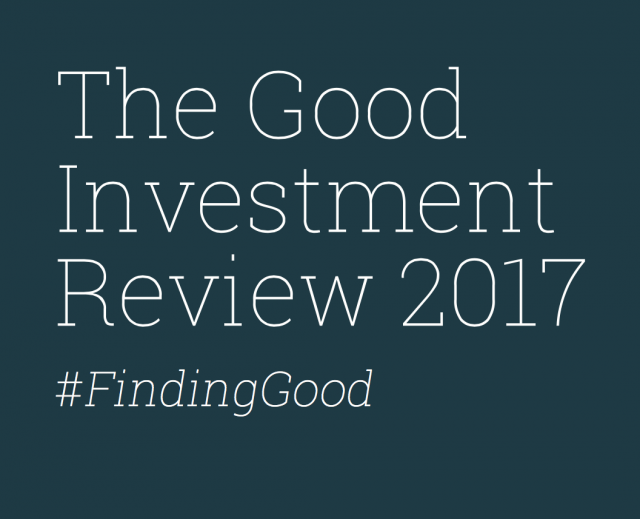The interview below is taken from our free-to-download Good Investment Review, published in partnership with 3D Investing.
Jon Forster is co-manager of Impax Environmental Markets plc. Impax is an investment firm that manages £5.7 billion for institutional clients and wealth managers. Its funds focus on investing in environmental markets and resource efficiency across energy, water, waste, and food and agriculture. 2016 was a vintage year for performance and Impax is seeing increasing interest from investors who are now recognising the strong drivers of these markets (population growth, urbanisation, climate change, ever tighter environmental regulation) and catalysts such as the Paris Climate Agreement.
 Tell us a bit about yourself – what gets you out of bed in the morning?
Tell us a bit about yourself – what gets you out of bed in the morning?
My young children – and evaluating and acting on the huge amounts of data and insight my team generates. It is a daily challenge that I look forward to every day. It is a very stimulating environment in which to work.
What makes your fund distinctive?
We specialise in “pure play” small and mid-cap solution providers, diversified across key sectors, with the aim of delivering superior long term investment returns. Impax Environmental Markets plc (“IEM”) recently passed its fifteenth anniversary, and with net assets of some £460 million, that makes it one of the oldest and largest funds of its type in the market. IEM has always had a strong positive intention built into the investment process and we believe it is the first listed equity product to quantify its net environmental impact.
While our primary investment objective is long term investment growth for investors, we can use these additional reporting metrics to decarbonise their portfolios, offset high emissions in other strategies, or simply improve their understanding of the extent of the positive outcomes of their investment decision. This holistic reporting approach resonates with many investors who seek strong financial returns over the longer term and want to see a positive impact from their investment. It also appeals to investors who understand that “carbon footprinting” only provides limited insight into carbon risk – particularly when investing in environmental solution providers.
How do you measure the impact of your fund?
We have assessed the positive impact at company level and attributed a portion to the portfolio based on our percentage equity ownership. Our impact metrics focus on C0 2 emissions and avoidance, renewable energy generation, water treatment and materials recovery and recycling.
We continue to develop and refine our impact analysis and methodology. Through our engagement with our investee companies we have obtained significant additional disclosures. For example, last year we were able to include the Scope 3 emissions of 17 companies, compared to six the year before. We can also work out the impact per £10 million invested, as well as that of IEM overall. Our methodology has been independently assured by EY.

Download the Good Investment Review
How do you engage with the companies in which you invest?
We are an active shareholder and take a company’s environmental, social and governance (ESG) policies and structures very seriously. We were one of the first signatories to the UK Stewardship Code. We exercise our votes by proxy to ensure that our investee firms align with our investors’ own principles and disclose a summary of this activity on a quarterly basis.
We also regularly engage with investee companies regarding specific ESG issues that may be of concern, both independently and on behalf of clients, as well as through joint representations with other investors.
It cannot be denied that we are living in an age of heightened geopolitical tension.
What’s your biggest concern for the next year?
Actually I am feeling very positive about the prospects for the markets in which we invest.
It cannot be denied that we are living in an age of heightened geopolitical tension. We have seen protest voting on a big scale with Trump and Brexit, and this year we could see several significant political shifts across Europe, accompanied by economic uncertainty and currency and equity market volatility. There are also concerns about US trade protectionism and its ongoing issues with North Korea. However, recent elections in France and the Netherlands have shown that things can be calmer than many expect, and on the subject of the United States, it is worth keeping in mind that many investors thought the incoming Trump administration spelt a death knell for US environmental markets. Not so. The White House cannot arrest technological innovation. Trump has pledged his commitment to improving air and water quality and the investment in infrastructure that this will require. Furthermore, US renewables are becoming less reliant on government subsidies and are also creating large numbers of new jobs.
Additionally, a huge part of Trump’s electioneering platform centred on delivering substantial amounts of investment in America’s infrastructure, which would drive the sector forward as well as create plenty of new jobs, for example, the solar industry created jobs 12 times faster than the overall rate of job creation in the US in 2015.
What’s been your most successful investment?
In the last year or so, investments in sustainable food and agriculture have been noteworthy. The United Nations estimates that the world population will exceed 9 billion by 2050, and most of this growth will be occurring in developing markets, where incomes are on the rise. With this tends to come increased demand for protein-rich, high calorie diets, and providing these is resource intensive and has significant environmental impact.
These challenges, those on the supply-side, as well as concerns centred on pollution worries, drive tremendous amounts of innovation and economic growth. The parts of this market that we are investing in have been successful and provide us with diversification across sectors, and we are continuing to find interesting investment opportunities – and this development looks set to gain momentum.
What’s been your biggest investment disappointment?
Our timing with solar energy. We avoided the sector bubble in 2007-08, but unfortunately, our holdings in this sector under-performed last year. This is because of short term oversupply problems and a temporary slowdown in key markets. It looks as if we increased our modest exposure just a bit too early. However, a combination of falling technology costs and cheap valuations leads us to believe that opportunities will emerge as these short term issues are resolved.
What would you like your fund to be identified with?
The words that spring to mind immediately are ‘growth’ and ‘positive environmental impact’.
We have delivered superior long term investment returns which demonstrates that even against a more volatile backdrop, the fund has proved its resilience and delivered robust returns for investors.



